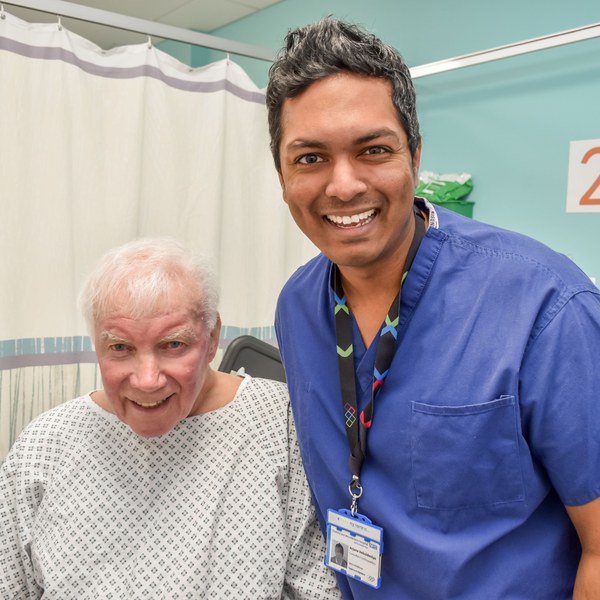Robotic surgical first heralds new era for knee replacements
27 February 2018
Chelsea and Westminster Hospital NHS Foundation Trust has carried out its first robotic-assisted total knee replacement operation – an innovative new surgical technique that will get patients back on their feet sooner than ever before. Initially part of a three month trial the results of the new procedure will be monitored to see how they compare to existing techniques.
Photo: Dr Arjuna Imbuldeniya (right) about to carry out the pioneering robot guided total knee replacement surgery at West Middlesex University Hospital
Chelsea and Westminster Hospital NHS Foundation Trust has carried out its first robotic-assisted total knee replacement operation—an innovative new surgical technique that will get patients back on their feet sooner than ever before. Initially part of a three month trial the results of the new procedure will be monitored to see how they compare to existing techniques.

Traditional surgery requires large cuts to be made around a patient’s knee to allow the use of the equipment required to perform the work. Using a mini semi-active robotic burr, surgeons are able to carry out more accurate and effective knee replacements with minimal invasion. This can help speed up recovery time, reduces post-operative pain and increases the longevity of the implants.
Arjuna said: “Total knee replacement surgery globally has an 80% satisfaction rate amongst patients. There is a growing consensus that utilising computer and robotic technology to help perform bespoke and precise placement of the implants to 0.1 of a millimetre or degree, might help us achieve excellent results in more of our patients. Both knee and hip replacements have the ability to transform the lives of people, which is one of the reasons I love doing them. Over the past 15 years since I started out in my surgical career I’ve seen many innovations and improvements. Computer and robotic assisted surgery is very exciting, both for me using it and for the patients who will benefit from the latest technology..
“When I first qualified as a surgeon, patients typically took a week to a week and a half to get back on their feet after having a knee replacement. This has come down to just few days recently, and the robotic technology will help patients get home even faster—as soon as a day or two after the operation. Another key benefit is that by being so precise with a knee replacement, it will last much longer and can be tailored to the unique anatomy of each patient. This is so important now as we see younger and younger people requiring this procedure.”
Speaking shortly before the surgery, patient David Patterson said: “I am looking forward to being pain free and being able to go for walks around Kew Gardens and by the river, as well as being able to travel and get back to gardening, which I enjoy.”
David worked as a postman in Chiswick from 1960 to his retirement in 2005, having moved down from his hometown of Glasgow.
The Trust prides itself on delivering world-class, high quality care for patients with a focus on continuous improvement and innovation. Just this month, Arjuna was awarded a Certificate of Excellence 2018 from independent patient feedback website, ‘iWantGreatCare’, based on his work at Chelsea and Westminster Hospital NHS Foundation Trust. These certificates are awarded annually to clinicians across the country who consistently receive positive feedback from those they’ve cared for.

